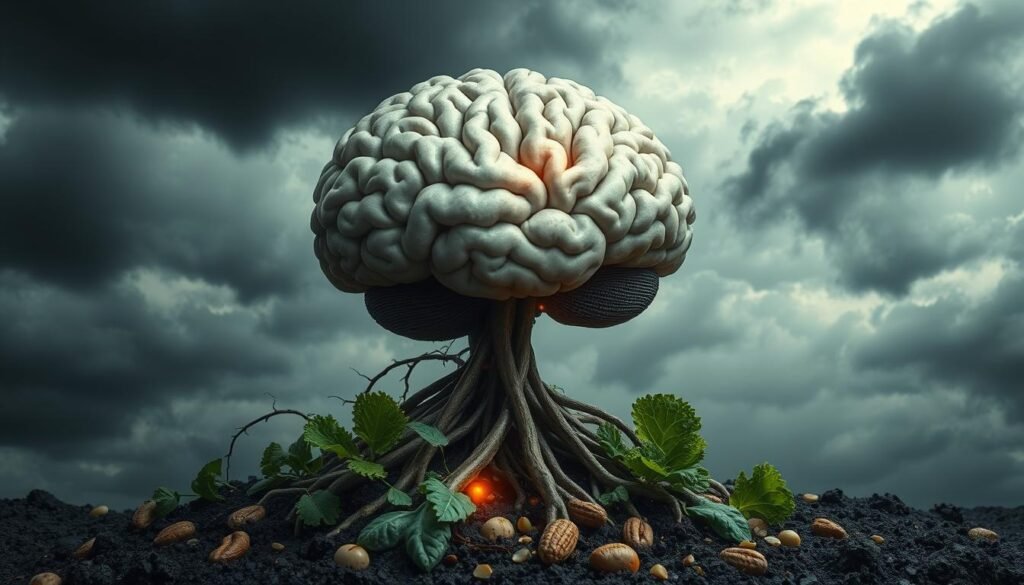About 70% of Americans don’t get enough magnesium. This mineral is key for mental health. Not having enough has been linked to more anxiety and depression. So, it’s worth looking into magnesium’s role in improving mood and mental well-being. With mental health issues on the rise, many people are trying magnesium supplements to help with depression.
Studies show that certain magnesium forms, like magnesium l-threonate, might help your brain work better and clear your mind. This can make handling emotions easier. Understanding how magnesium affects mental health is crucial. Both doctors and regular folks are interested in using magnesium for depression naturally. Knowing the benefits of magnesium, like mood management, is important before starting supplements.
If you’re curious about how magnesium could lessen anxiety and boost mental health, check out more information on magnesium supplements.
Key Takeaways
- About 70% of Americans are magnesium deficient.
- Magnesium supplementation may alleviate symptoms of anxiety and depression.
- Specific forms like magnesium l-threonate can boost cognitive clarity.
- Healthcare providers recommend discussing magnesium supplementation before use.
- Dietary factors and lifestyle choices can significantly affect magnesium levels.
- Further research is needed to solidify the link between magnesium and mental health outcomes.
Introduction to Magnesium and Mental Health
Magnesium is key for our health and happiness. It helps our bodies work right, especially our brains. Studies show not having enough magnesium may lead to depression. A lot of people don’t get the magnesium they need, which could be why more are facing mental health issues.
Keeping your magnesium level up is crucial for good mental health. Research links low magnesium to more depression. This shows why getting enough magnesium is important for looking after our minds.
Studies found people with less magnesium often feel more depressed. Adding magnesium to our diet might help fight anxiety and depression. Focusing on magnesium can help keep our minds strong and better handle stress.
Understanding Depression and Its Impact
Depression is a serious mood disorder. It comes with deep sadness and a lack of interest in once-loved activities. Around 322 million people worldwide are living with it, making it a leading cause of disability. This condition leads to emotional and physical problems that can upset everyday life. It makes keeping relationships, working, and socializing hard for those affected.
The fight against depression requires effective treatments. Research has shown that magnesium might help with depressive symptoms. Diet is key for mental health, and not getting enough magnesium could make symptoms worse. Understanding how magnesium affects mood could open new doors for treating depression.
Despite progress in mental health study, we still need a full understanding. Depression harms not just emotional health but also physical health, work life, and overall happiness. It’s important to understand how our lifestyle, including what we eat, plays a role. Mental health experts are particularly interested in magnesium’s role.
| Depression Statistics | Impact on Population |
|---|---|
| Prevalence in Dialysis Patients | 22.8% to 39.3% diagnosed |
| Increased Risk Compared to General Population | 3 to 4 times higher |
| Lifetime Risk of Depression in Americans | 29% (approximately 97 million people) |
As we learn more about depression, new research, like studies on magnesium, shows us ways to manage and treat it. Future research will keep looking into how magnesium might help improve moods for those with this common disorder.
The Role of Magnesium in the Body
Magnesium is the fourth most common mineral in our bodies. It helps with over 300 biochemical reactions. About 60% of it is in our bones, showing how important it is for healthy bones. Sadly, almost half of the adults in the United States don’t get enough magnesium. This could harm their health.
This mineral doesn’t just keep bones strong; it’s also vital for our nerves and blood sugar control. Magnesium keeps our brains working right by managing neurotransmitters. This affects our mood. A lack of magnesium has been linked to a greater chance of depression.

Studies show that getting more magnesium can make our bones stronger. It also helps with mental health. For example, taking about 500 mg of magnesium each day can make people less depressed. Another study found that just 248 mg a day lowered anxiety and depression in six weeks.
We need to make sure we’re getting enough magnesium, maybe even through supplements. It’s linked to better mental health and moods. Magnesium can really help with depression, giving hope to those looking for natural ways to feel better.
Research on Magnesium Deficiency and Depression
Studies are increasingly linking magnesium deficiency to depression. Many who are depressed have lower magnesium levels than those who are not. Magnesium supplements or dietary changes could help improve mental health by addressing this deficiency.
Connection Between Low Magnesium Levels and Depression
About 3.8% of people experience depression. This includes 5% of adults and 5.7% of the elderly. Meanwhile, 2–15% of Americans face magnesium deficiency. This rate is higher among those with diabetes or in hospitals. Reduced magnesium levels are often seen in those with depression, suggesting a link to the condition.
Studies Highlighting Magnesium Benefits for Depression
Research on magnesium’s effect on depression has shown varied results. However, some findings are promising. In one clinical trial, daily intake of 500 mg of magnesium for eight weeks greatly reduced depression symptoms.
A systematic review included seven randomized trials with 325 adults. These trials tested doses ranging from 40 to 500 mg. They used forms like magnesium sulfate and magnesium chloride. Notably, participants saw improvements in depression and anxiety symptoms within two weeks. This suggests magnesium supplements could benefit those struggling with mental health issues.

Magnesium and Mood: What the Science Says
Research has found a strong link between magnesium and mood. This mineral is key in making neurotransmitters like serotonin and dopamine. These brain chemicals are crucial for feeling balanced. A notable study discovered that almost 40% of people with depression had low magnesium levels.

Magnesium does more than affect brain chemicals. It also helps control stress hormones, which can make you feel calm. People who have depression that doesn’t get better with treatment often have low magnesium in their brain fluid. This shows how vital magnesium is for our mental health. A study found taking magnesium supplements could really help reduce depression symptoms, especially if you don’t have enough magnesium in your blood.
More research adds to the evidence that magnesium supplements are beneficial. For example, people who took magnesium chloride saw big improvements in their anxiety and depression in just two weeks. These results show how important it is to have the right amount of magnesium for your mental well-being.
Eating foods rich in magnesium like whole grains, leafy greens, and nuts can increase your levels. Although supplements might cause side effects like nausea and diarrhea, they offer hope for better mood and mental health. For deeper insights into natural mental health remedies, check out this complete guide.
Magnesium Depression: Can Supplementation Help?
More people are looking at magnesium to fight depression. Studies show about half of Americans don’t get enough magnesium. Many are exploring magnesium’s role in easing depressive symptoms with interest.
In 2020, a review covered 32 studies on magnesium and depression. It found three studies showing a big improvement in symptoms for those taking magnesium. This shows magnesium might help alongside other depression treatments.
Magnesium comes in different forms like glycinate, citrate, and oxide. Each type has its own benefits, from improving mental health to soothing muscle pain. Choosing the right magnesium type depends on personal health goals.
The current research on magnesium is hopeful. But it’s too early to say it should be the main treatment for depression or anxiety. The effectiveness of magnesium also depends on the type you take.
Adults usually need about 300 mg of magnesium daily. Some might need more to help with anxiety, depression, or sleeping problems. Always talk to a doctor before starting any supplement to make sure it’s safe and right for you.
Types of Magnesium Supplements for Mental Health
Almost half of the people in the U.S. get less magnesium than they need. It’s vital to look at the different magnesium supplements for mental health. These supplements are key for improving mental wellness. They could help reduce symptoms of depression related to magnesium deficiency.
Different Forms of Magnesium
Different magnesium supplements exist, each with its own benefits. Let’s look at some common ones:
- Magnesium Glycinate – Known for its calming effects, it may aid in reducing anxiety and improving sleep quality.
- Magnesium Citrate – This form offers good bioavailability and is often suggested for easing constipation.
- Magnesium L-Threonate – Highly regarded for its ability to increase magnesium concentrations in brain cells, it shows promise for enhancing cognitive function and managing depression.
- Magnesium Taurate – This form may help regulate blood sugar and support cardiovascular health.
- Magnesium Chloride – Well absorbed and often used for treating low magnesium levels, it has also demonstrated effective results in improving depressive symptoms when administered regularly.
Bioavailability and Effectiveness of Magnesium Types
It’s important to understand how well different magnesium types are absorbed. Below is a table showing this, along with each form’s benefits:
| Magnesium Type | Bioavailability | Primary Benefits |
|---|---|---|
| Magnesium Oxide | Lowest | Poorly absorbed, not ideal for deficiency |
| Magnesium Citrate | High | Effective for constipation and mental health support |
| Magnesium L-Threonate | Very High | Best for cognitive improvements and depression management |
| Magnesium Taurate | Moderate | Blood sugar regulation and cardiovascular health |
| Magnesium Glycinate | High | May reduce anxiety and improve sleep |
Understanding magnesium’s benefits sheds light on using supplements to support mental health. Selecting the right type and knowing its bioavailability can improve mental wellness significantly.
Ideal Magnesium Dosage for Depression Relief
It’s essential to find the right magnesium dose for depression relief. Adults typically need 310 to 420 mg of magnesium each day. But many people get less than this, which might affect their mood. Some may even need higher doses, like psychiatric patients or those with factors like older age or certain medical conditions.
Magnesium glycinate has shown to be quite effective. People with major depression noticed improvements after taking 125-300 mg for a week. This type of magnesium is easy to absorb and generally well-tolerated. Still, taking too much magnesium can be harmful, so it’s important to talk with a doctor before starting supplements.
Before deciding on a magnesium dosage, get your levels checked. Talk about your options with your doctor. Even though magnesium can help with mental health, we need more studies to understand its full impact. The right magnesium dose can lead to better mental health.